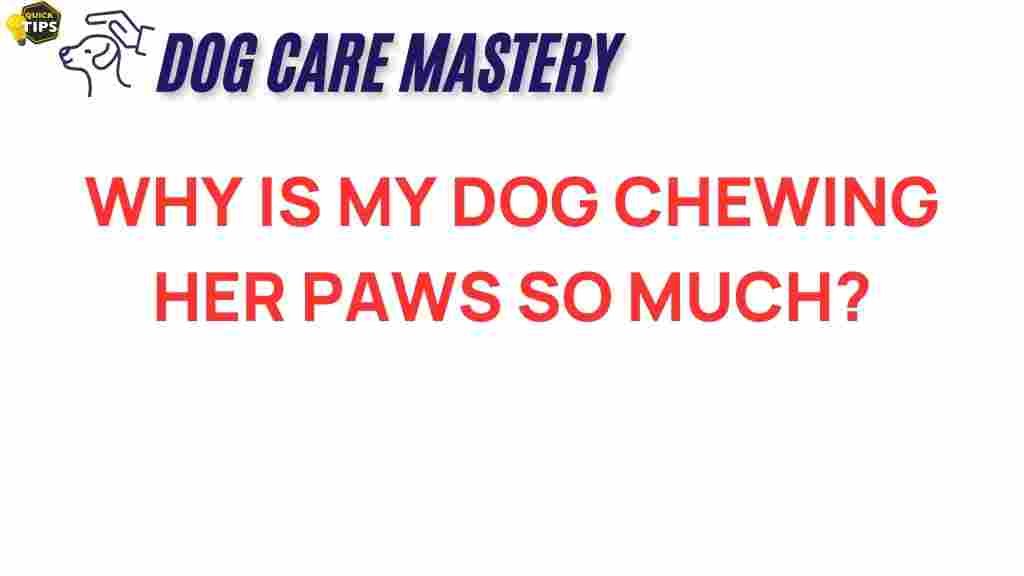Understanding Dog Behavior: Why Is My Dog Chewing Her Paws?
As a dog owner, you may have noticed your furry friend engaging in some peculiar behaviors, one of the most concerning being the incessant chewing of her paws. While it may seem like a harmless habit, it can indicate underlying issues that need addressing. In this article, we will unravel the mystery surrounding this common dog behavior and provide insights into why your dog may be chewing her paws, how to address it, and when to seek professional help.
What Does It Mean When a Dog Chews Her Paws?
Chewing on paws can be a normal behavior for dogs, but excessive chewing can signal various problems. Some potential reasons for this behavior include:
- Allergies: Dogs can suffer from environmental allergies (like pollen and dust mites) or food allergies that can lead to itchy skin and paws.
- Infections: Bacterial or fungal infections can cause irritation and discomfort, prompting dogs to chew at their paws.
- Parasites: Fleas, ticks, and mites can irritate a dog’s skin, leading to excessive chewing.
- Anxiety or Stress: Dogs may chew their paws as a coping mechanism for anxiety or stress, similar to how humans might bite their nails.
- Boredom: If a dog lacks sufficient mental stimulation or physical exercise, she may resort to chewing her paws out of boredom.
Step-by-Step Process to Investigate the Issue
If you’ve noticed your dog chewing her paws frequently, it’s essential to take a systematic approach to identify the cause. Here’s a step-by-step guide:
1. Observe the Behavior
Take note of when and where your dog chews her paws. Is it at certain times of the day or in specific situations? Understanding the context can provide clues about the underlying issue.
2. Check for Physical Symptoms
Look for signs of redness, swelling, or irritation on your dog’s paws. Check between the toes and around the pads for any abnormalities.
3. Evaluate Dietary Factors
Consider any recent changes to your dog’s diet. Allergies to certain ingredients could be the culprit. Try to keep a food diary and note any new treats or meals introduced.
4. Examine the Environment
Assess your dog’s environment for potential allergens. This includes plants, cleaning products, and any recent changes in her surroundings.
5. Monitor Activity Levels
Ensure your dog is getting enough exercise and mental stimulation. A lack of physical activity can lead to boredom, prompting her to chew her paws.
Troubleshooting Tips for Dog Behavior
Once you’ve investigated the possible causes, here are some troubleshooting tips to help address the issue:
- Consult Your Veterinarian: If you suspect allergies, infections, or parasites, schedule an appointment with your vet for a thorough examination and possible tests.
- Implement a Regular Grooming Routine: Regularly check your dog’s paws for debris, cuts, or signs of irritation. Keeping nails trimmed and fur around the paws clipped can help prevent issues.
- Change Diet if Necessary: If allergies are suspected, consider transitioning to a hypoallergenic dog food or grain-free diet. Consult your vet for recommendations.
- Improve Mental Stimulation: Engage your dog in more interactive play and provide toys that challenge her mentally. Puzzle toys and treat-dispensing toys can keep her occupied.
- Manage Anxiety: If anxiety is a factor, consider calming aids like pheromone diffusers or anxiety wraps. Training programs to address separation anxiety can also be beneficial.
When to Seek Professional Help
If your dog continues to chew her paws despite your efforts, it may be time to seek professional help. Here are some signs that indicate you should consult a veterinarian or a professional dog trainer:
- Persistent chewing that leads to injury or raw skin.
- Signs of infection, such as discharge or foul odor.
- Behavior changes, such as aggression or withdrawal.
- Continuous licking or chewing that worsens over time.
- Difficulty in managing anxiety or stress-related behaviors.
Addressing dog behavior issues can be challenging, but understanding the underlying causes can significantly help. If you need additional resources, consider checking out this comprehensive guide on dog behavior.
Conclusion
In conclusion, if you find yourself asking, “Why is my dog chewing her paws?” know that you are not alone. Many dog owners face this issue at some point. By understanding the potential causes and implementing the troubleshooting tips we’ve discussed, you can help your dog find relief. Remember that addressing dog behavior takes time, patience, and sometimes professional guidance. Always prioritize your dog’s health and well-being, and don’t hesitate to reach out for help when needed.
For more information on canine health and behavior, visit reputable sources like the American Kennel Club or consult your local veterinarian. Your dog’s happiness and comfort are worth the effort!
This article is in the category Behavior and created by dogcaremastery Team
